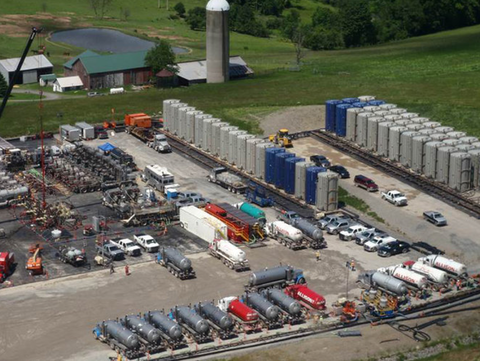Carbon and water footprint of energy resources
Main content start

We are studying the carbon and water footprints of hydraulically fractured oil and natural gas and comparing them to other fossil and renewable fuels. The Jackson lab and colleagues published the first studies of drinking water quality and shale gas extraction, and have examined wastewater disposal and naturally occurring radioactive materials. We also measure hydrocarbon emissions upstream from wellpads and downstream in cities, producing the first publicly available maps of thousands of natural gas leaks across the streets of Boston, Manhattan, and Washington, D.C.
People
- Michelle and Kevin Douglas Provostial Professor and Senior Fellow at the Woods Institute for the Environment and at the Precourt Institute for Energy
- Assistant Professor, McGill University
- Staff Scientist, PSE Healthy Energy
- CEO, Indrio Technologies
Publications
- Elevated levels of diesel range organic compounds in groundwater near Marcellus gas operations are derived from surface activities. (2015). Proceedings of the National Academy of Sciences USA, 112. https://doi.org/doi:10.1073/pnas.1511474112
- Methane emissions from natural gas infrastructure and use in the urban region of Boston, Massachusetts. (2015). Proceedings of the National Academy of Sciences USA, 112. https://doi.org/doi:10.1073/pnas.1416261112
- Natural gas pipeline replacement programs reduce methane leaks and improve consumer safety. (2015). Environmental Science and Technology Letters, 2. https://doi.org/doi:10.1021/acs.estlett.5b00213
- Noble gases: a new technique for fugitive gas investigation in groundwater. (2015). Groundwater, 23.
- Pre-drilling background groundwater quality in the Deep River Triassic Basin of central North Carolina, USA. (2015). Applied Geochemistry, 60. https://doi.org/doi:10.1016/j.apgeochem.2015.01.018
- Recommendations on Model Criteria for Groundwater Sampling, Testing, and Monitoring of Oil and Gas Development in California. (2015). Lawrence Livermore National Laboratory LLNL-TR-669645.
- The depths of hydraulic fracturing and accompanying water use across the United States. (2015). Environmental Science and Technology, 49. https://doi.org/doi:10.1021/acs.est.5b01228
- Air impacts of increased natural gas acquisition, processing, and use: a critical review. (2014). Environmental Science & Technology, 48. https://doi.org/doi:10.1021/es4053472
- China’s fuel gas sector: history, current status, and future prospects. (2014). Utilities Policy, 28.
- Natural gas pipeline leaks across Washington, D.C. (2014). Environmental Science & Technology, 48. https://doi.org/doi:10.1021/es404474x
- New tracers identify hydraulic fracturing fluids and accidental releases from oil and gas operations. (2014). Environmental Science and Technology, in press. https://doi.org/doi:10.1021/es5032135
- Noble gases identify the mechanisms of fugitive gas contamination in drinking-water wells overlying the Marcellus and Barnett Shales. (2014). Proceedings of the National Academy of Sciences USA, 111. https://doi.org/doi:10.1073/pnas.1322107111
- Oil and gas wells and their integrity: implications for shale and unconventional resource exploitation. (2014). Marine and Petroleum Geology, 56. https://doi.org/doi:10.1016/j.marpetgeo.2014.03.001
- Risks and risk governance in unconventional shale gas development. (2014). Environmental Science and Technology, 48. https://doi.org/doi:10.1021/doi:10.1021/es502111u
- The environmental costs and benefits of fracking. (2014). Annual Review of Environment and Resources, 39. https://doi.org/doi:10.1146/annurev-environ-031113-144051
- The integrity of oil and gas wells. (2014). Proceedings of the National Academy of Sciences USA, 111. https://doi.org/doi:10.1073/pnas.1410786111
- China’s synthetic natural gas revolution. (2013). Nature Climate Change, 3. https://doi.org/doi:10.1038/nclimate1988
- Geochemical and isotopic variations in shallow groundwater in areas of the Fayetteville Shale development, north-central Arkansas. (2013). Applied Geochemistry, 35. https://doi.org/doi:10.1016/j.apgeochem.2013.04.013
- Impacts of shale gas wastewater disposal on water quality in western Pennsylvania. (2013). Environmental Science and Technology, 47. https://doi.org/doi:10.1021/es402165b
- Increased stray gas abundance in a subset of drinking water wells near Marcellus shale gas extraction. (2013). Proceedings of the National Academy of Sciences, U.S.A, 110. https://doi.org/doi:10.1073/pnas.1221635110
- Mapping urban pipeline leaks: methane leaks across Boston. (2013). Environmental Pollution, 173. https://doi.org/doi:10.1016/j.envpol.2012.11.003
- Shale gas extraction in North Carolina: research recommendations and public health implications. (2013). Environmental Health Perspectives, 121. https://doi.org/doi:10.1289/ehp.1307402
- The effects of shale gas exploration and hydraulic fracturing on the quality of water resources in the United States. (2013). Procedia Earth and Planetary Science, 7. https://doi.org/doi:10.1016/j.proeps.2013.03.213
- China’s coal price disturbances: observations, explanations, and potential implications for global energy economies. (2012). Energy Policy, 51. https://doi.org/doi:10.1016/j.enpol.2012.09.010
- China’s growing methanol economy and its implications for energy and the environment. (2012). Energy Policy, 41. https://doi.org/doi:10.1016/j.enpol.2011.11.037
- Considering shale gas extraction in North Carolina: lessons from other states. (2012). Duke Environmental Law and Policy Forum, 22.
- Geochemical evidence for possible natural migration of Marcellus Formation brine to shallow aquifers in Pennsylvania. (2012). Proceedings of the National Academy of Sciences, U.S.A., 109. https://doi.org/doi:10.1073/pnas.1121181109
- Shallow groundwater quality and geochemistry in the Fayetteville Shale gas-production area, north-central Arkansas. (2012). U.S. Geological Survey Scientific Investigations Report, 2012.
- The impact of geologic variability on capacity and cost estimates for storing CO2 in deep-saline aquifers. (2012). Energy Economics, 34. https://doi.org/doi:10.1016/j.eneco.2011.11.015
- The potential of waste-to-energy in reducing greenhouse gas emissions. (2012). Carbon Management, 3. https://doi.org/doi:10.4155/cmt.12.11
- Methane contamination of drinking water accompanying gas-well drilling and hydraulic fracturing. (2011). Proceedings of the National Academy of Sciences, U.S.A., 108. https://doi.org/doi:10.1073/pnas.1100682108
- The potential impacts of climate-change policy on freshwater use in thermoelectric power generation. (2011). Energy Policy, 39. https://doi.org/doi:10.1016/j.enpol.2011.07.022
- Potential impacts of leakage from deep CO2 geosequestration on overlying freshwater aquifers. (2010). Environmental Science and Technology, in press, 44. https://doi.org/doi:10.1021/es102235w
- Physical and economic potential of geological CO2 storage in saline aquifers. (2009). Environmental Science and Technology, 43. https://doi.org/doi:10.1021/es801572e




